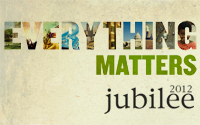 It has been my custom to share a rather long post this time each year, reflecting on our role at the annual Jubilee conference, sponsored by the Coalition for Christian Outreach (CCO) and filling you in a bit on the books that sold there. CCO is the campus ministry organization for whom we regularly sell books, that Beth and I worked for the late 70s, being with Penn State students in McKeesport, PA. Later, I served CCO staff out of their Pittsburgh-based headquarters. In those years I developed curriculum on teaching Christian worldview, relating faith and college scholarship, and did a bit of peace and justice education, including stuff that was perhaps more controversial in those years than I want to recall. I’d like to think that to this day at least a little bit of the CCO’s vision—seen most obviously in the big Jubilee event—was influenced by those years when some of us helped set the direction and ethos of the CCO as a culturally-engaged, reformational, institutionally-savvy, evangelistic and disciple-making organization attuned to the needs and issues of collegiates in the modern university.
It has been my custom to share a rather long post this time each year, reflecting on our role at the annual Jubilee conference, sponsored by the Coalition for Christian Outreach (CCO) and filling you in a bit on the books that sold there. CCO is the campus ministry organization for whom we regularly sell books, that Beth and I worked for the late 70s, being with Penn State students in McKeesport, PA. Later, I served CCO staff out of their Pittsburgh-based headquarters. In those years I developed curriculum on teaching Christian worldview, relating faith and college scholarship, and did a bit of peace and justice education, including stuff that was perhaps more controversial in those years than I want to recall. I’d like to think that to this day at least a little bit of the CCO’s vision—seen most obviously in the big Jubilee event—was influenced by those years when some of us helped set the direction and ethos of the CCO as a culturally-engaged, reformational, institutionally-savvy, evangelistic and disciple-making organization attuned to the needs and issues of collegiates in the modern university.
Many great CCO leaders have come and gone over the years and tons of extraordinary staff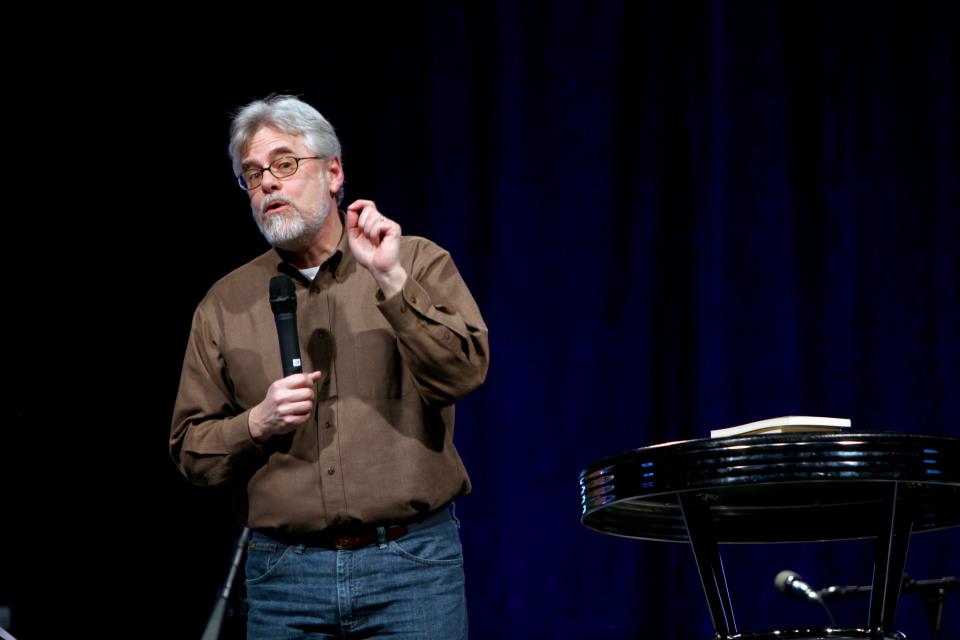 have touched upwards towards a million students since their humble beginnings at a few Pittsburgh-based schools, so my own role isn’t large. But I have been given the opportunity to teach a lot of classes, speak at a lot of campuses, helped consult with Jubilee committees over the years and sold a boatload of books in the last decades, so we are (how to say this?) humbly glad to see the CCOs Jubilee vision continue to be articulated and lived with integrity so consistently over the years. CCO does excellent work partnering with churches and colleges and the Jubilee event bears witness to their slogan “transforming college students to transform the world.” Beth and I and our store staff are honored to get to play a small role in it. It is the coolest thing we do all year! Thanks be to God and thanks to the CCO.
have touched upwards towards a million students since their humble beginnings at a few Pittsburgh-based schools, so my own role isn’t large. But I have been given the opportunity to teach a lot of classes, speak at a lot of campuses, helped consult with Jubilee committees over the years and sold a boatload of books in the last decades, so we are (how to say this?) humbly glad to see the CCOs Jubilee vision continue to be articulated and lived with integrity so consistently over the years. CCO does excellent work partnering with churches and colleges and the Jubilee event bears witness to their slogan “transforming college students to transform the world.” Beth and I and our store staff are honored to get to play a small role in it. It is the coolest thing we do all year! Thanks be to God and thanks to the CCO.
I know most of our BookNotes readers aren’t directly involved in young adult ministry or college work. But I hope our report is interesting to you and that it causes you to ponder a bit about your own context of ministry and discipleship. Heck, maybe you know some outward-looking congregation that is near a college that might want to partner with the CCO in reaching out to local students. Or maybe you might want to put together some smaller sort of Jubilee- type conference in your community. (Remember, a year ago at BookNotes, I mentioned a nearby local church that did a conference on work?) Maybe you want to use some of the books I’m about to tell you about in your own small group or adult Sunday school class. Near Pittsburgh or not, involved in campus work or not, if you share our passion about books that provide a robust theology for a vibrant, church-based Christian lifestyle, which creates signposts for the coming Kingdom of God “on Earth as it is in Heaven” across all of life and culture, than this stuff should excite you. I hope!
I won’t repeat all that’s been said on facebook and twitter and in comments under the many pictures that have been appearing at the Jubilee Facebook page this week, but I must congratulate Chris Carson & Sarah Winkler, the best Jubilee team since Butch Cassidy and the Sundance Kid, since Batman and Robin. And that tuxedoed duo of emcees Melleby & Bindewald deserve much applause, despite their reee-dicc-u-lus jokes about me, using the Chuck Norris internet meme. I didn’t get half of what they were doing at first, but realized it was pretty funny. To see my dumb pacifist face photo-shopped onto the muscular bod and ripped abs of the powerhouse Mr. Norris with his guns blazing and that big American flag, well, let’s just say that it literally took my breath away. Convincing almost 3000 folks to listen carefully to my mature cajoling about buying good books in the aftermath of that stunt was daunting, to say the least. Still, it was the most fun I’ve had on stage in quite a long time. (Although I’ll never forget the time a few years ago when Calgaro had me do the manic PowerPoint show known as Pechakucha.)
And so, to the chase: three things about Jubilee 2012 that are important for us all to consider, complete with my running commentary about books that were sold at Jubilee or that relate to these take-away points. The Spirit is moving in these ways, I believe, and we want to offer these resources with deep sincerity and hope. You know there is a link to our bookstore’s order form is at the end.
If you’ll hang in there with me, we’ll list a handful of others that sold well, or should have sold well and didn’t, or that we talked about, or whose authors were there or that we just want to offer at this deep discounted price. All books mentioned are 30% off, for less than one week only, and while supplies last. 

And, we have a free book offer, too. Free. Book. Offer. We don’t call it Jubilee for nothing…
THREE IMPORTANT THINGS TO LEARN FROM JUBILEE 2012
1. The Biblical narrative of creation-fall-redemption-restoration gives us the best account of the story we find ourselves in and shapes our worldview in generative, fruitful ways.
The Biblical narrative of a fully good creation invaded by profound sin and curse but being fully redeemed and restored by the God of faithful covenant explains more and carries more useful freight than most of us realize. Albert Wolter’s Creation Regained: Biblical Basis for a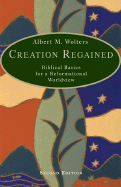 Reformational Worldview (Eerdmans; $14.00) explores the significance of the full-orbed realities of creation-fall-redemption-restoration for our worldview and has been a CCO fav for years. This book really does explain what is unique and helpful about what he calls a neo-Calvinist approach, noting that while nearly every Christian tradition holds to some similar formulation, his Dutch Calvinist tradition takes the implications of these doctrines perhaps more generously and broadly and draws more implications from them than most other denominational traditions. His famous chapter on “structure and direction” is essential reading, I think, to appreciate the best proposals of the Jubilee vision, and is a good tool to help us explore what is creationally good about something (money, sex, sports, politics, art, race) and what is misdirected and dysfunctional. Any social reformer needs to know what is good and what is bad, what should be changed and what should remain, in her arena of influence and no one books lays a foundation for helping us with that cultural discernment as does Creation Regained. A few other speakers at Jubilee agreed, since it was a book that was
Reformational Worldview (Eerdmans; $14.00) explores the significance of the full-orbed realities of creation-fall-redemption-restoration for our worldview and has been a CCO fav for years. This book really does explain what is unique and helpful about what he calls a neo-Calvinist approach, noting that while nearly every Christian tradition holds to some similar formulation, his Dutch Calvinist tradition takes the implications of these doctrines perhaps more generously and broadly and draws more implications from them than most other denominational traditions. His famous chapter on “structure and direction” is essential reading, I think, to appreciate the best proposals of the Jubilee vision, and is a good tool to help us explore what is creationally good about something (money, sex, sports, politics, art, race) and what is misdirected and dysfunctional. Any social reformer needs to know what is good and what is bad, what should be changed and what should remain, in her arena of influence and no one books lays a foundation for helping us with that cultural discernment as does Creation Regained. A few other speakers at Jubilee agreed, since it was a book that was
cited often.
This unfolding story of cross-bought cosmic redemption has been the animating vision of the conference since the late philosopher Pete Steen taught those of us who were running it in the mid to late 1970s about Abraham Kuyper ‘s vision of the Lordship of Christ over all of culture and how to read the Bible faithfully to find it as a worldview-shaping drama. I smiled when I heard a young lady at the conference refer to herself as a Kuyperian. The old Dutch Prime Minister and theologian was well honored by her saying that.
And, it was wonderful to have the Acton Institute there at Jubilee with a banner about their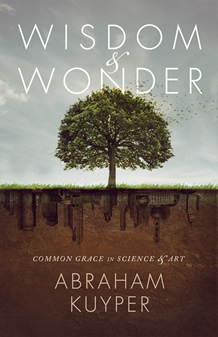 new translation of Kuyper on common grace, a book we featured called Wisdom and Wonder: Common Grace in Science and Art (Christian’s Library Press; $14.99) Francis Schaeffer, who some of you may know, was important to the CCO in its early years, and he gleaned some of this Kuyper narrative worldview stuff from a Dutch art historian named Hans Rookmaaker, who himself learned it from a philosopher named J. P. A. Mekkes, who had been a student of the Free University of Amsterdam’s heavyweight Herman Dooyeweerd. Mekkes and Rookmaaker met in a POW camp during the Nazi occupation of Holland, and CCO and Jubilee stand, if a bit indirectly, in this grand tradition of Christ’s clear call over all of life and culture, as Kuyper taught. We not only had a few Francis Schaeffer books at Jubilee, but a Rookmaaker book on the arts, and a thin but dense philosophical treatise by Mekkes published by Dordt College Press. The best book on Dooyeweerd is the highly-acclaimed one by Jonathan Chaplin, Herman Dooyeweerd: Christian Philosopher of State and Civil Society (University of Notre Dame Press; $68.00.) This is the precise intellectual movement that so influenced Al Wolters and which gives Creation Regained its vision and heft. Who knew that Jubilee existed as it does because God in His mercy had Mekkes tell Rookmaaker about Dooyeweerd. Years later, Shaeffer spoke at Grove City College and the next night at Geneva College, both in Western Pennsylvania. Young CCO workers were in those crowds and they learned to appreciate this worldview stuff from Pete Steen who was acquainted with the work of each of these scholar-activists.
new translation of Kuyper on common grace, a book we featured called Wisdom and Wonder: Common Grace in Science and Art (Christian’s Library Press; $14.99) Francis Schaeffer, who some of you may know, was important to the CCO in its early years, and he gleaned some of this Kuyper narrative worldview stuff from a Dutch art historian named Hans Rookmaaker, who himself learned it from a philosopher named J. P. A. Mekkes, who had been a student of the Free University of Amsterdam’s heavyweight Herman Dooyeweerd. Mekkes and Rookmaaker met in a POW camp during the Nazi occupation of Holland, and CCO and Jubilee stand, if a bit indirectly, in this grand tradition of Christ’s clear call over all of life and culture, as Kuyper taught. We not only had a few Francis Schaeffer books at Jubilee, but a Rookmaaker book on the arts, and a thin but dense philosophical treatise by Mekkes published by Dordt College Press. The best book on Dooyeweerd is the highly-acclaimed one by Jonathan Chaplin, Herman Dooyeweerd: Christian Philosopher of State and Civil Society (University of Notre Dame Press; $68.00.) This is the precise intellectual movement that so influenced Al Wolters and which gives Creation Regained its vision and heft. Who knew that Jubilee existed as it does because God in His mercy had Mekkes tell Rookmaaker about Dooyeweerd. Years later, Shaeffer spoke at Grove City College and the next night at Geneva College, both in Western Pennsylvania. Young CCO workers were in those crowds and they learned to appreciate this worldview stuff from Pete Steen who was acquainted with the work of each of these scholar-activists.
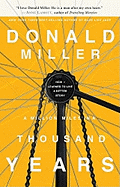 I am glad that so many these days invite us to think in terms of story and storied theology—think Donald Miller, for one example. I promoted A Million Miles in a Thousand Years: How I Learned to Live a Better Story (Nelson; $15.99) which I adore, not least because Jubilee speaker and friend Bob Goff plays a role in it.) I even like a little, inexpensive book by John Eldredge called Epic: The Story God is Telling (Nelson; $2.99) that reminds us that life unfolds like a drama, a play, and we get to take up our role in the epic adventure of it all. The second in the fascinating trio of novels by Brian McLaren is called The Story We Find Ourselves In (Jossey-Bass; $14.99) and brings together these themes that our life is a story and that the Bible is best understood as a story God has and is telling. The respected work of missiologist Leslie Newbigin has helped us think of the role of narrative in theology and thanks to the Nazarene Barefoot Ministries his little gem of radio talks, showing simply how the Bible is one continues story, is now reprinted. It is called A Walk Through the Bible ($12.99) and is wonderful. Do you know about the recent, big Zondervan project inviting folks to read through the whole Bible by using their helpful version called The Story: The Bible as One Continuing Story of
I am glad that so many these days invite us to think in terms of story and storied theology—think Donald Miller, for one example. I promoted A Million Miles in a Thousand Years: How I Learned to Live a Better Story (Nelson; $15.99) which I adore, not least because Jubilee speaker and friend Bob Goff plays a role in it.) I even like a little, inexpensive book by John Eldredge called Epic: The Story God is Telling (Nelson; $2.99) that reminds us that life unfolds like a drama, a play, and we get to take up our role in the epic adventure of it all. The second in the fascinating trio of novels by Brian McLaren is called The Story We Find Ourselves In (Jossey-Bass; $14.99) and brings together these themes that our life is a story and that the Bible is best understood as a story God has and is telling. The respected work of missiologist Leslie Newbigin has helped us think of the role of narrative in theology and thanks to the Nazarene Barefoot Ministries his little gem of radio talks, showing simply how the Bible is one continues story, is now reprinted. It is called A Walk Through the Bible ($12.99) and is wonderful. Do you know about the recent, big Zondervan project inviting folks to read through the whole Bible by using their helpful version called The Story: The Bible as One Continuing Story of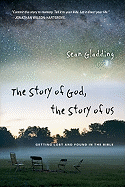 God and His People ($19.99; there are other pieces, too—youth versions, DVD curriculum, etc. which we happily promote. Do check out that link as it’s pretty spiffy.) We awarded last year as a best book of 2011 one of the more creative Bible overviews published these days The Story of God, the Story of Us: Getting Lost and Found in the Bible by Sean Gladding (IVP; $17.00; the fabulous DVD sells for $30.00.) Or, thinking of story and narrative, think of N. T. Wright, who insists that the even the didactic teaching of New Testament letters like Romans are to be understand best within their narrative context, the story that was going on in those places in first century Judaism. Think of political theologians like Stanley Hauerwas that talk about narrative theology. (I’m showing off, but you should know the important name of Thomist philosopher Alister MacIntyre who has written astutely about this topic.)
God and His People ($19.99; there are other pieces, too—youth versions, DVD curriculum, etc. which we happily promote. Do check out that link as it’s pretty spiffy.) We awarded last year as a best book of 2011 one of the more creative Bible overviews published these days The Story of God, the Story of Us: Getting Lost and Found in the Bible by Sean Gladding (IVP; $17.00; the fabulous DVD sells for $30.00.) Or, thinking of story and narrative, think of N. T. Wright, who insists that the even the didactic teaching of New Testament letters like Romans are to be understand best within their narrative context, the story that was going on in those places in first century Judaism. Think of political theologians like Stanley Hauerwas that talk about narrative theology. (I’m showing off, but you should know the important name of Thomist philosopher Alister MacIntyre who has written astutely about this topic.)
Or, just think of how folks so resonate with memoir these days, faith journeys creatively told by writers like Anne Lamott, Lauren Winner, Barbara Brown Taylor, Margot Starbuck, Frederick Buechner. Narrative, story, worldview, journey. We are all shaped by a story and one of the biggest questions of life may be which story?
Yet, to say we are shaped by story isn’t all that needs saying. Even some who talk about the unfolding drama of the Bible fail to realize how the main chapters of that story should inform our own sense of things. Few see fully the way in which the narrative of the Bible with its high-points of creation-fall-redemption-restoration can form the fundamental contours of our story, and few tease out the implications of it all the way Al Wolter’s does in Creation Regained. Wolter’s taught this reformational vision, a Christ-centered hermeneutic the see Christ of redeemer of the creation and the King of a new creation breaking now into history, to CCO staff decades ago and Jubilee 2012, with its four main sections, each exploring these four chapters of the Story, made that explicit as never before. It was a very, very good reminder, and thrilling to have each of the main speakers explore these chapters of the story throughout the weekend. From James Smith Friday night on the implications of living in a created cosmos to Richard Mouw Sunday morning holding out the hope of a restored city, the chief chapters of the meta-narrative were wonderfully told and the implications of these building blocks of our worldview were magnificently explored.

artwork: God’s Story by David Arms
It is no wonder, then, that we sold o
ut of Chris Brewer’s wonderful art book Art That Tells the Story (The Gospel Through Shared Experience; $24.95.) It is no wonder that one of the best sellers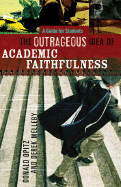 was Michael Witmer’s book Heaven is a Place on Earth: Why All You Do Matters to God (Zondervan; $16.99.) Specifically exploring this broad, storied view for college students, Don Opitz’s book, co-written with Derek Melleby, was a hit: The Outrageous Idea of Academic Faithfulness: A Guide for Students (Brazos; $14.99.) Their short and playful chapter on worldviews—conflicting ones in the college textbooks and the coherent one from the Scriptures—and how these narratives/value systems/worldviews influence students is as succinct and clarifying and important as anything in any such book.
was Michael Witmer’s book Heaven is a Place on Earth: Why All You Do Matters to God (Zondervan; $16.99.) Specifically exploring this broad, storied view for college students, Don Opitz’s book, co-written with Derek Melleby, was a hit: The Outrageous Idea of Academic Faithfulness: A Guide for Students (Brazos; $14.99.) Their short and playful chapter on worldviews—conflicting ones in the college textbooks and the coherent one from the Scriptures—and how these narratives/value systems/worldviews influence students is as succinct and clarifying and important as anything in any such book.
It is no wonder that we sold a bunch of Dr. Mouw’s little Bible study, When the Kings Come Marching In: Isaiah and the New Jerusalem (Eerdmans; $15.00) that shows the Biblical hopes of new creation, including the (purified) cultural artifacts that will endure into our bodily existence in the (re)newed city of God. It is certainly one of my favorite books and I can’t describe easily its impact on the legacy of the CCO; it was used years ago for staff training and remains a vital resource for the development of a Biblical-informed view of culture, justice, and hope. It is a book that reminds us of the final climax of the plot of the Scriptures.
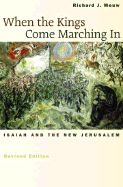 Dr. Mouw’s Sunday morning talk was so reasonable and clear, but yet–there is no doubt about this–it rocked the world(views) of many who were there. Do we really believe that God’s good news is so broadly good that “all things” will be restored to original goodness? Yes, he did quip that Lady Gaga’s work will take a bit more purifying than some, but do we really believe that the work of our human hands, our cultural artifacts and inventions, our art and our games, will be with us–transformed by healing fire– through-out our urban life in eternity? That there is some continuity between this world and the next? That is the serious trajectory Mouw sees in his text from Isaiah and, as he often does, he ended with good preaching from Revelation 5 and then the new city stuff from Revelation 21 & 22. This book is not difficult nor extensive, but it is more than fanciful speculation. It offers a really eye-opening theology of culture, based on careful exegesis, showing why, well, why “everything matters.” For obviously understandable reasons, vans and buses from the hundreds of college represented at Jubilee had to get going after the event ended, so we sadly didn’t get to sell as many of Mouw’s books as we wished. This little study, though, is a must-read. We hope CCO staff will share it with their students if they have not yet, and that those want a bit of the happy Jubilee vibe might pick it up.
Dr. Mouw’s Sunday morning talk was so reasonable and clear, but yet–there is no doubt about this–it rocked the world(views) of many who were there. Do we really believe that God’s good news is so broadly good that “all things” will be restored to original goodness? Yes, he did quip that Lady Gaga’s work will take a bit more purifying than some, but do we really believe that the work of our human hands, our cultural artifacts and inventions, our art and our games, will be with us–transformed by healing fire– through-out our urban life in eternity? That there is some continuity between this world and the next? That is the serious trajectory Mouw sees in his text from Isaiah and, as he often does, he ended with good preaching from Revelation 5 and then the new city stuff from Revelation 21 & 22. This book is not difficult nor extensive, but it is more than fanciful speculation. It offers a really eye-opening theology of culture, based on careful exegesis, showing why, well, why “everything matters.” For obviously understandable reasons, vans and buses from the hundreds of college represented at Jubilee had to get going after the event ended, so we sadly didn’t get to sell as many of Mouw’s books as we wished. This little study, though, is a must-read. We hope CCO staff will share it with their students if they have not yet, and that those want a bit of the happy Jubilee vibe might pick it up.
Here is an address Mouw gave at Houghton College a few years back and it is very, very good. Give it a listen. You’ll love the line about the Border’s sign called “over-sized religion.” It will help you worship Christ more properly and it is particularly relevant for those who are interested in culture, institutional life, social action, and public affairs. He really gets this “creation-fall-redemption-restoration” picture of the Biblical message.

In your faith community do you reflect on the meaning of creation care, talk about God’s call to meaningful work, encourage the arts, work on good citizenship, discuss sex, engage popular culture? Why or why not? If you do, is it clear that these human and cultural task are to be “unpacked” (as James Smith put it) as creational entities, but that they also are battle grounds for spiritual warfare, too? That is, do you realize how each and every zone of life is created good but now distorted, “contested” territory (as C.S. Lewis put it.) That a normative unfolding of anything–from just approaches to family law to nuanced understandings of science or technology, from truly healing insights about health care to allusive views of the creative arts, —may be different from what the world offers and may thereby be controversial? As Smith said, we have to “occupy creation” and he meant, surely, that there is a counter-cultural edge to Christian principles and practices in this distorted and idolatrous world. To make the case and to actually live out the implications that flow from our deepest convictions may (or so the Bible says) get us into trouble. Occupy creation, indeed!
J. Mark Bertrand was there this year and he is quite funny and way, way smart. He did two pretty serious workshops–he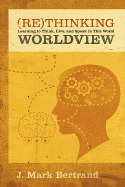 is a good novelist who has a series of well-crafted, intense crime fiction (Back on Murder and Patterns of Wounds [Bethany House; $14.99 each] with the third coming later this year)–but his first book is a must-read in my view. It is called (Re)Thinking Worldview: Learning to Think, Live, and Speak in This World (Crossway; $16.99) and he takes the “worldview conversation” a step further down the path. Check out his website for the book and see if there isn’t something useful there, for you or for some you know. Getting these at 30% off is a real deal and I think it would make a great small group study. I never tire about hearing how this wholistic gospel story affects the ways and practices and ethics of daily life as we work and witness in our modern world. Mark shows how worldview is not just about “thinking” but about living and speaking winsomely about the story we find ourselves in. Sharp stuff, to be sure! Yeah, I love reading worldview books — especially these that are well written and move us towards appropriate cultural engagement— so I guess I’m a bit odd.
is a good novelist who has a series of well-crafted, intense crime fiction (Back on Murder and Patterns of Wounds [Bethany House; $14.99 each] with the third coming later this year)–but his first book is a must-read in my view. It is called (Re)Thinking Worldview: Learning to Think, Live, and Speak in This World (Crossway; $16.99) and he takes the “worldview conversation” a step further down the path. Check out his website for the book and see if there isn’t something useful there, for you or for some you know. Getting these at 30% off is a real deal and I think it would make a great small group study. I never tire about hearing how this wholistic gospel story affects the ways and practices and ethics of daily life as we work and witness in our modern world. Mark shows how worldview is not just about “thinking” but about living and speaking winsomely about the story we find ourselves in. Sharp stuff, to be sure! Yeah, I love reading worldview books — especially these that are well written and move us towards appropriate cultural engagement— so I guess I’m a bit odd.
But allow me to be candid here (we’re among friends, right?) I am sometimes a bit perplexed that there are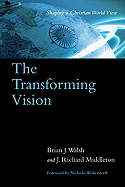 folks who like our mix of titles and topics here at Hearts & Minds, those who are nearly shocked how we tend to hold together more liberal and more conservative views, how we patch together in some sort of coherent vision the wide array of authors and denominational traditions that we do. We heard it a hundred times at Jubilee –folks aren’t used to seeing these sorts of books in a religious bookstore. I’m really encouraged when customers write nice notes or ask questions as if they are piqued about where we are coming from. Some say that we have helped them re-think what a religious bookstore might be. Yet, most often, new friends don’t really seem to want to understand what most drives us, they don’t really seem to get the way our study of worldviews has helped us become who we are here at Hearts & Minds. Many thoughtful friends still don’t seem intrigued enough to want to ponder, as one writer puts it, the “metaphors we live by.” So, if I may be forthright, if you like Hearts & Minds, or, similarly, if you like Jubilee, you should read books like Al Wolter’s Creation Regained, the equally important The Transforming Vision: Shaping a Christian Worldview by Brian Walsh & Richard Middleton (IVP; $16.00) or Mark Bertrand’s more recent (Re)Thinking Worldview.
folks who like our mix of titles and topics here at Hearts & Minds, those who are nearly shocked how we tend to hold together more liberal and more conservative views, how we patch together in some sort of coherent vision the wide array of authors and denominational traditions that we do. We heard it a hundred times at Jubilee –folks aren’t used to seeing these sorts of books in a religious bookstore. I’m really encouraged when customers write nice notes or ask questions as if they are piqued about where we are coming from. Some say that we have helped them re-think what a religious bookstore might be. Yet, most often, new friends don’t really seem to want to understand what most drives us, they don’t really seem to get the way our study of worldviews has helped us become who we are here at Hearts & Minds. Many thoughtful friends still don’t seem intrigued enough to want to ponder, as one writer puts it, the “metaphors we live by.” So, if I may be forthright, if you like Hearts & Minds, or, similarly, if you like Jubilee, you should read books like Al Wolter’s Creation Regained, the equally important The Transforming Vision: Shaping a Christian Worldview by Brian Walsh & Richard Middleton (IVP; $16.00) or Mark Bertrand’s more recent (Re)Thinking Worldview.
Really understanding how the Biblical narrative shapes how we lean into life and gives us a way to imagine how life ought to be, giving us ways to evaluate the principalities and powers of our world, without becoming revolutionaries who just want to tear every thing down, simply necessitates pondering Wolters, Walsh & Middleton, Betrand and other similar books. If you’ve followed our store for long you may know that I’m particularly fond of Walsh’s several books–all which emerge in one way or another from this first, important one he co-wrote with Richard Middleton. (Yes, it is true: N.T. Wright dedicated his first really big volume, The New Testament and the People of God, to Brian, and developed that whole first section about worldviews from Walsh’s work in Transforming Vision and elsewhere. So even brainy world-class theological stars like Wright admit to a debt to Walsh, not to mention the work of Brian’s wife, Syliva Keesmaat, with whom he wrote Colossians Remixed, another book we pushed a bit at Jubilee.) If you love Jubilee or you like Hearts & Minds, consider get some of these worldviewy books, okay? They are the genesis and frame of our efforts and you’ll be richer for spending a season or so pondering this generative topic.
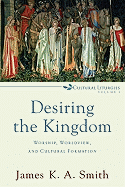 You should know, too, that the person who has advanced a somewhat new understanding of worldviews and how they work (what some might call a more thick account) is philosopher James K.A. Smith who, as we’ve noted, rocked the house and fired us up Friday night at Jubilee this year. Desiring the Kingdom: Worship, Worldview, and Cultural Formation (BakerAcademic; $21.99) is doubtlessly the most important book on this topic in decades and one simply cannot be conversant in the latest sorts of socio-theological conversations without knowing it. There are two other massive volumes a-coming, making it eventually a trilogy, so you should man up (can women, “man up” — I think so!) and just get it. We’ve reviewed it here at BookNotes and many others (more important than me) have affirmed its significant merits. For instance, here is a review by Eric Miller, who was also a speaker at Jubilee this year. It is very, very well done. James, by the way, did one of the best Friday night talks in Jubilee history (and, uh, I have done one of those Friday night talks) and, despite being interrupted by a fire alarm and massive evacuation,he regained the group’s attention an hour later and finished off his powerful explication of the implications of a thick doctrine of creation, pregnant with implications for how we embody our faith, how we think and know and relate and live and invite others into this grand, great story. I think if you read some of this stuff and come to grasp it well, it will truly be a game-changer, as they say. May it be so for the young adults gathered at Jubilee and may it be so for Hearts & Minds fans.
You should know, too, that the person who has advanced a somewhat new understanding of worldviews and how they work (what some might call a more thick account) is philosopher James K.A. Smith who, as we’ve noted, rocked the house and fired us up Friday night at Jubilee this year. Desiring the Kingdom: Worship, Worldview, and Cultural Formation (BakerAcademic; $21.99) is doubtlessly the most important book on this topic in decades and one simply cannot be conversant in the latest sorts of socio-theological conversations without knowing it. There are two other massive volumes a-coming, making it eventually a trilogy, so you should man up (can women, “man up” — I think so!) and just get it. We’ve reviewed it here at BookNotes and many others (more important than me) have affirmed its significant merits. For instance, here is a review by Eric Miller, who was also a speaker at Jubilee this year. It is very, very well done. James, by the way, did one of the best Friday night talks in Jubilee history (and, uh, I have done one of those Friday night talks) and, despite being interrupted by a fire alarm and massive evacuation,he regained the group’s attention an hour later and finished off his powerful explication of the implications of a thick doctrine of creation, pregnant with implications for how we embody our faith, how we think and know and relate and live and invite others into this grand, great story. I think if you read some of this stuff and come to grasp it well, it will truly be a game-changer, as they say. May it be so for the young adults gathered at Jubilee and may it be so for Hearts & Minds fans.
2. The Biblical notion of vocation can fund a meaningful and transformative view of the role of work; such a vision for the dignity and influence of work must be more seriously explored in our faith communities.
Once one sees one’s life as storied, and learns that the story about the goodness of creation and the seriousness of the fall and the realities of redemption and the hopes of restoration are the chief and formative influences of our understandings of everything, we will not only be wise about stuff, but we will be energized to live out that story—God is in Christ rescuing the planet and its cultures, artifacts, institutions. We will, as so many Jubilee speakers noted, realize that “everything matters.” Yes.
And one of the big things that matters is our sense of calling, our vocation, our work. I remain frustrated that so few people use our (admittedly less than attractive) “Books by Vocation” bibliography. (See my chapter in the collection of book reviews, Besides the Bible edited by Dan Gibson, John Pattison & Jordan Green (Biblica; $14.99) which is a review of Os Guinness’ stellar book, The Call, to hear again my lament of how few people ever ask us about for books relating faith and work.) Too many people think that “discerning vocation” is for those who are trying to hear God’s call to go into ministry. God bless those who are going in to ministry, but what about those going in to chemistry? Why do we celebrate the “sons and daughters” of the church that become pastors, but don’t seem to give a tinkers damn about those going into dance or law or motorcycle repair? And—okay, I’m on a rant, here, and will restrain myself with just one or two more sentences: why do we tend to honor work (when we do at all) by inviting Christians to just be respected, to be ethical, to be excellent, at work, as if the reform of institutions, or striving for creative influence, or the fighting of new battles and offering of new ideas aren’t part of the big picture of being Christ’s salt and light in the work-world? Why, when we affirm labor at all in church, is it so typically uninspiring and not very robust? Where are the churches that create people like, say, Jeffrey Wigand, Erin Brockovich, Patch Adams or Blake Mycoskie? Why at Jubilee do these young adults say “I’ve never heard this kind of stuff before?” As a life-long churchman, I say it is to our shame, and I am sorry that young adults have to hear for the first time from some crazy conference in Pittsburgh that God cares about their major.
Did you know that there is a pre-conference gathering each year for adults called Jubilee Professional where faith-based workers, entrepreneurs, artists, and leaders from the world of Pittsburgh corporations, start-ups, non-profits, and leadership consultancies gather to reflect on the same themes as the CCO student gathering? Every town should be as fortunate as Pittsburgh, having an organization like Serving Leaders. Everyone seriously interested in embodying a Kingdom vision in the warp and woof of a city’s life, working for Spirit-directed social and institutional r
eform in the marketplace should put Jubilee Professional on their calendars for 2013. Plan now to attend next year’s one-day “Jubilee for grown ups” which I am sure you would find beneficial. Thanks to the likes of Redeemer Presbyterian’s Center for Faith and Work and their sharp director, Katherine Leary Alsdorf, for helping Pittsburgh’s Serving Leaders pull off this kind of classy event. Thanks to John Stahl-Wert, their inspiring servant leader, a good author himself, for caring about God’s work in the world of corporations and galleries and service organizations. And thanks to them all for inviting H&M to offer an annotated bibliography custom designed for their renewal in the workd-world gathering. (E-mail me for it if your interested and I’ll gladly forward you a typed copy.) My few moments on their stage, with their business and civic leaders, was a thrill; moments like that remind Beth and I of some of our more grandiose hopes and dreams for our bookish mission. You go, Jubilee Pro!
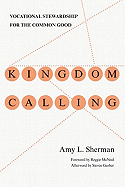 It seems to me, then, that one of the great things that Jubilee 2012 offered, somewhat in tandem with Jubilee Professional, was the opportunity to hear Amy Sherman talk about her stellar new book, Kingdom Callings: Vocational Stewardship for the Common Good (IVP; $16.00.) Amy spoke at Jubilee Pro and addressed nearly a quarter of the Jubby kids as well. As you may recall, we honored her with an award in our little “Best Books of 2011” list. We implied, however, that her book’s award was a tie, and it was: it was tied with another new book, Work Matters: Connecting Sunday
It seems to me, then, that one of the great things that Jubilee 2012 offered, somewhat in tandem with Jubilee Professional, was the opportunity to hear Amy Sherman talk about her stellar new book, Kingdom Callings: Vocational Stewardship for the Common Good (IVP; $16.00.) Amy spoke at Jubilee Pro and addressed nearly a quarter of the Jubby kids as well. As you may recall, we honored her with an award in our little “Best Books of 2011” list. We implied, however, that her book’s award was a tie, and it was: it was tied with another new book, Work Matters: Connecting Sunday Worship to Monday Work by pastor Tom Nelson (Crossway; $15.99), another new excellent resource that explores a truly transformational view of vocation and calling into the work-world. One of the small things I like about Work Matters (besides its really helpful insight, its great clarity and zest) are the one or two-page sidebars, examples about good folks in Nelson’s congregation who illustrate a good theology of work and who are doing notable “integration” work in their sphere of influence. David Greusel, Hearts & Minds pal and Jubilee speaker, is one of those featured. That he is an architect who designs baseball stadiums like the wonderful PNC Park is pretty cool. More importantly, his story in the book is a testimonial of God’s work in his work-life. Kudos to Rev. Nelson for writing in conversation with guys like Greusel. (And thanks to Greusel for coming to Jubilee to speak with undergrads and architect students! What a gift for such students to converse with such a mentor. Go here for an array of his essays in Comment magazine’s archives.)
Worship to Monday Work by pastor Tom Nelson (Crossway; $15.99), another new excellent resource that explores a truly transformational view of vocation and calling into the work-world. One of the small things I like about Work Matters (besides its really helpful insight, its great clarity and zest) are the one or two-page sidebars, examples about good folks in Nelson’s congregation who illustrate a good theology of work and who are doing notable “integration” work in their sphere of influence. David Greusel, Hearts & Minds pal and Jubilee speaker, is one of those featured. That he is an architect who designs baseball stadiums like the wonderful PNC Park is pretty cool. More importantly, his story in the book is a testimonial of God’s work in his work-life. Kudos to Rev. Nelson for writing in conversation with guys like Greusel. (And thanks to Greusel for coming to Jubilee to speak with undergrads and architect students! What a gift for such students to converse with such a mentor. Go here for an array of his essays in Comment magazine’s archives.)
So I love the book by Nelson Work Matters, and commend it to you. But Kingdom Callings, by Amy Sherman, is particularly apropos for this Jubilee take-away point that we are to serve God in our work and that that may mean doing more than just showing up and being morally good and professionally admirable, with a nice willingness to talk about faith. Yes, “bloom where you are planted” is a major step in the right direction, but she pushes us a bit more. Kingdom Callings is a visionary—dare I say audacious—book which holds up other models, other strategies, if you will, of how to be faithful in the work-world. Ms Sherman offers four avenues or pathways, from the not-so-simple but basic “bloom where you’re planted” because all good work matters to God, to pushing for change in one’s industry to using skills learned at work pro bono to assist the poor and under-served, and more. This serious work is honestly a book that I’ve long waited for (and it is made all the more special by the beautifully written afterword by former Jubilee conference director, Steven Garber.) Ms Sherman’s operating thesis, which she explores in truly refreshing, bold ways, is drawn from Proverbs 11:10 that declares that when “the righteous prosper the city rejoices.” Is this really so? (I admit that I haven’t pondered this verse before, and never heard a sermon on it. Hmm.) So unchurched folks will be glad if your business (nonprofit/church/school/art gallery/cafe/counseling clinic/family/factory/little league team) is successful? Really? Well.
I think that there are reasons for the often-mentioned “resentment” harbored by folks about the rich and successful, and it isn’t just the sin of envy, as social conservatives tend to glibly imply. That is, when Wall Street (for instance) prospers but does so in ways that do not illustrate a profound commitment to the common good, it makes sense that folks feel resentful; it is understandable, I think to be uneasy about the success of our neighbors if their financial gain comes at the expense of norms and values that we know to be vital for the social fabric. The Biblical alternative to this resentment, as Sherman carefully shows, is enterprise done for the common good; work that serves, that exists knowingly as an act of love of neighbor; those who watch as socially responsible enterprises prosper will be glad for their success, because they realize that it isn’t ill-gotten and that their contribution to society has been just and good and well-intended. Anyway, that’s what that Proverb suggests. Sherman inspires us to relate our faith and Biblical understandings to the work-world and to our callings as culture makers and then she ratchets up the challenge by pondering the implications of this Proverb. Her subtitle is important: “vocational stewardship for the common good.”m Are we relating faith and work in ways that are imaginative and helpful, ways that at the end of the day we can say that, through our work, we have loved our neighbors, we’ve made the world somehow a better place? Are we stewarding our vocations, leveraging our influences in ways that are just and help the cause of local flourishing? Has your pastor asked you about that, ever? Have you ever been invited to an adult education course suggesting that you have an obligation to earn your living in a way that is “for the common good”? (If you are interested in this question of how the church does or doesn’t help lay folks in these things, by the way, there is a brand new book that I have skimmed already called How the Church Fails Businesspeople (and what can be done about it) by John C. Knapp [Eerdmans; $15.00,] which I highly recommend.)
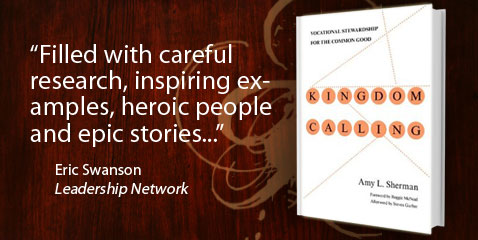
I think every church should have a few of Amy Sherman’s Kingdom Callings books around to inspire and challenge folks to live out their (Kingdom) callings more audaciously, more creatively, even in generative ways that carry within them the possibility of truly serving the common good. Pastors: is your city happy about the success of the business folk of your congregation? Why or why not? Do the social entrepreneurs and reformers and visionaries of your city feel supported by your church as they fight the good fight, day by day? Why or why not? And, not incidentally, do the poor of your neighborho
od feel blessed by the success of your more middle class members? Kingdom Callings: Vocational Stewardship for the Common Good could help you think through how to cast a vision for ways your people could honor God more intentionally and witness to Christ’s love more clearly by doing this missional thing with the work of their hands. Don’t you long for something like that, for church members who are seriously engaged not climbing the corporate ladder for their own glory, or even so that they can give more to the church, but so that they can make a difference for the community? I am not kidding: this is the Jubilee vision par excellence—relating faith and life, yes, bringing Christian principles to bear in the work-world and academy and marketplace, yes, but doing it in a way that brings service and goodness–virtuous human flourishing–to the social fabric and even to the needy and hurting. Nobody combines this reformational worldview perspective with common good missional service like Jubilee, and nobody has explored this as seriously for callings and careers as has Ms Sherman. Buy a couple of Kingdom Callings, please! Here is Garber’s afterward which you can read. There is a link there, too, to a radio interview with Sherman from Pittsburgh’s WORD FM.
3. A third take-away idea from Jubilee is that disciple-making ministry must be relational as we network folks with helpful communities of growth and service. Which includes realizing that reading is a spiritual discipline and that leaders must be life-long learners.
Jubilee is zany and fun and big and loud. Even the kids get worn out, and we oldsters smac the sides of heads after midnight when our ears are ringing. Besides the big gatherings and the numerous break-out sessions (on engineering and education and race and art and politics and poverty and sex and so, so much more) there are oodles of late-night options, from swing dancing to attending a screening of the new Blue Like Jazz movie with director Steve Taylor, to prayer meetings and impromptu jam sessions. There were helpful booths from organizations like Compassion International and Toms Shoes,
the sides of heads after midnight when our ears are ringing. Besides the big gatherings and the numerous break-out sessions (on engineering and education and race and art and politics and poverty and sex and so, so much more) there are oodles of late-night options, from swing dancing to attending a screening of the new Blue Like Jazz movie with director Steve Taylor, to prayer meetings and impromptu jam sessions. There were helpful booths from organizations like Compassion International and Toms Shoes, the Humane Society and Urbana. There were several graduate schools represented and mission agencies and summer opportunities for students, from working in Christian camping to serving in urban missions to options for leadership development in places like the Ocean City Beach Project. This is an event that works hard to network people, to dream big, to get kids thinking about their lives and their choices and their affiliations.
the Humane Society and Urbana. There were several graduate schools represented and mission agencies and summer opportunities for students, from working in Christian camping to serving in urban missions to options for leadership development in places like the Ocean City Beach Project. This is an event that works hard to network people, to dream big, to get kids thinking about their lives and their choices and their affiliations.
Here is a question that frames the first part of this take-away: are you helping those whom you mentor (especially the young) to think about their whole lives with passion and purpose? Of course we need to run Bible studies and help people learn the basics of Christian growth. And we need to invite them into the bigger story of God. But alongside the proclamation of this worldviewish c-f-r-r narrative and the centrality of thinking about work as a vocation and holy calling, the CCO and Jubilee models what I want to call missional intentionality. I wonder how many pastors invite young adults to work at a summer camp, or suggest that they attend a conference, or network them with a discipleship opportunity, or introduce them to people who can help them on the next leg of their journey? If you see a good article on facebook, do you share it with somebody who needs that information? If you are invited to an event, do you think “Yes I can go” or “No, I can’t go” or do you think of people you can tell, folks you should invite? If you are spiritually guiding a younger believer, do you invite them to plan ways they can use their gifts in choosing a major, then invite them to think about short-term mission projects that use their talents and gifts? Do you help find for them opportunities to plug in to service organizations? Just for one small instance of this relational ministry model, I wonder if congregational leaders follow up after somebody takes on a Compassion child, making sure the community celebrates this new relationship and obligation? (A number of students committed to supporting a child through Compassion International thanks to Shaun Grove’s compelling invitation.) I hope those who did not only are affirmed in their college fellowship groups but that their home churches are invited in to follow up on the story.
And, now, for the second part of this take away point—drum roll, please—the CCO and Jubilee are right to do this by using books. I’m tickled, of course, that as an Associate Staff of the CCO, I’m given such wonderful opportunities — making book spiels at Jubilee, for instance. But I’m not talking necessarily about about myself or my role, as glad as we are for it, but about their commitment to Christian learning. Our role at Jubilee is an indication of the CCOs vital insight that books have been used by God in the history of redemption (from the oldest of Bible times and throughout church history) to further God’s Kingdom and to equip God’s people for faithful service.
are right to do this by using books. I’m tickled, of course, that as an Associate Staff of the CCO, I’m given such wonderful opportunities — making book spiels at Jubilee, for instance. But I’m not talking necessarily about about myself or my role, as glad as we are for it, but about their commitment to Christian learning. Our role at Jubilee is an indication of the CCOs vital insight that books have been used by God in the history of redemption (from the oldest of Bible times and throughout church history) to further God’s Kingdom and to equip God’s people for faithful service.
In this information age (or inventive age, as Doug Pagitt describes our era in a book by that title) most Christians are simply going to have to rethink some things, study some new stuff, bone up on their Bible and theology, and learn from the ways others are articulating our Christian callings. It seems to me a mark of either shallowness or hubris to think you can live this Kingdom vision thing in a complicated world without being dri
ven to serious study and learning (and prayer, too, for that matter.) When I hear of Christian folks who don’t read much I can only presume they are either nominal in their faith or prideful in their sense of their own knowledge. Look, friends, this Jubilee vision, wide-as-life discipleship, in-the-world-but-not-of-it posture of culturally-reforming Christ-honoring, Kingdom callings is no simple matter. Jamie Smith put it bluntly Friday night when he said it just might get you killed. You can’t do it alone, or on your hunches.
So, surprise, surprise, I hope people buy books, form study groups, commit to re-considering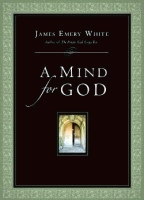 and re-learning things, entertaining new ideas, and move forward with new hope of transforming discipleship in fresh and faithful ways. Semper reformans, semper reformanda and all that, you know.
and re-learning things, entertaining new ideas, and move forward with new hope of transforming discipleship in fresh and faithful ways. Semper reformans, semper reformanda and all that, you know.
I rejoice that many congregations from many quarters are doing good, good stuff. I really don’t measure the lives of others by how many books they buy. But it is true that these squares of paper and ink are, in fact, tools for our work, ammunition for the battle, bread for the journey. If you need ’em, we got ’em. If you don’t need ’em, you may want to ask why that is. CCO really gets this call to the reformation of thinking and the necessarily habit of Christian reading. It has from its earliest days told their staff to read widely, to study deeply, and to use books as they disciple and mentor students. There was a CCO bookseller before me, and I trust there will be one after me. They know that readers become leaders.
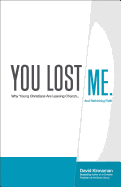 To not promote reading as a spiritual discipline, I’m afraid, short-circuits the sustainability and longevity of young disciples. Just read David Kinnaman’s You Lost Me: Why Young Christians Are Leaving the Church (Baker; $17.99) if you don’t believe that we are losing a generation of younger church kids because we don’t engage their minds, offering resources to think about civic life, science and the like. Students loved David at Jubilee, by the way, as he invited them to consider why so many of their peers walk away from church and faith and what they might do about it. It just blows me away to consider that one of the truths uncovered in the research that David did (and that is explained in this book) is how many high school students going off to college express interest in science-related majors and how many of them report that their church (or youth group) has never once in their memory offered any affirmation of the sciences. It’s no wonder they drift from faith, if they don’t realize that there are any number of ways to reconcile the alleged conflict between faith and science. Students like David’s books and more than a few stood amazed when they saw our large display of books on science, engineering, math and such.
To not promote reading as a spiritual discipline, I’m afraid, short-circuits the sustainability and longevity of young disciples. Just read David Kinnaman’s You Lost Me: Why Young Christians Are Leaving the Church (Baker; $17.99) if you don’t believe that we are losing a generation of younger church kids because we don’t engage their minds, offering resources to think about civic life, science and the like. Students loved David at Jubilee, by the way, as he invited them to consider why so many of their peers walk away from church and faith and what they might do about it. It just blows me away to consider that one of the truths uncovered in the research that David did (and that is explained in this book) is how many high school students going off to college express interest in science-related majors and how many of them report that their church (or youth group) has never once in their memory offered any affirmation of the sciences. It’s no wonder they drift from faith, if they don’t realize that there are any number of ways to reconcile the alleged conflict between faith and science. Students like David’s books and more than a few stood amazed when they saw our large display of books on science, engineering, math and such.
So, CCO helps these students who are coming to realize that there is much Christian learning to do and that it is exciting to explore ideas in light of the gospel. Many want to rise to the occasion when we tell them that the word disciple in the Bible means learner.
Life-long learners are needed, now more than ever. Does your church foster an ethos of learning, of reading, of study? Can your people explain what might be meant by having “the mind of Christ”? Do they get excited when Romans 12:1-2 or 2 Timothy 2:15 comes around in the lectionary? Books and reading matters for those committed to the Jubilee vision and for those who mentor others in Kingdom discipleship.

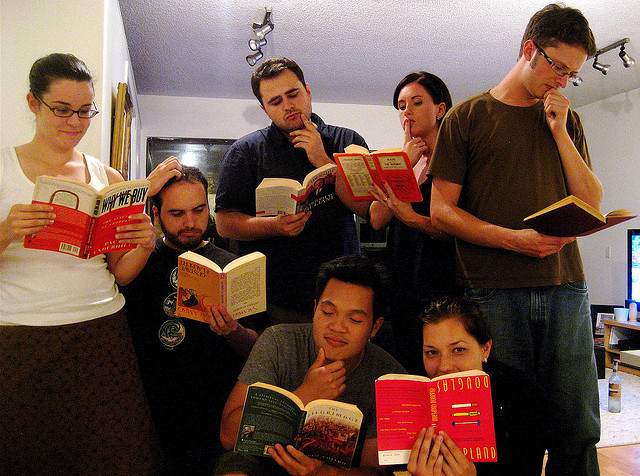
Do you pass on books to others, share our BookNotes reviews, help your friends and church members join the conversations about the relationship of faith and the modern world? We stand ready to continue to serve CCO students and Jubilee participants and everybody else looking in on this movement as we carry forward this conversation and nurture a lifestyle of learning for Kingdom service. We hope our many friends and customers in their own places and ministry settings, seek out good books for good learning. As Jubilee 2012 reminds us, “Everything Matters.” We are a bookstore that believes that, and we carry topics often not represented in most religious bookstores. Colossians 1:17 insists doxologically that all that matters (everything!) holds together in Christ Jesus, so His rule pertains to all of life. There’s a whole lot to know, a whole lot to learn, a whole lot to live. Thanks for letting us play a role in your on-going faithfulness. We are immensely grateful and eager to serve in this way. We hope that you, like we, are inspired when thinking of the good work of the CCO and the vibrant witness of the Jubilee conference.
As one Jewish-minded friend wrote at the end: next year in Jerusalem. See ya in Pittsburgh, February 2013!
ANY BOOK MENTIONED ON SALE AND A FREE BOOK OFFER
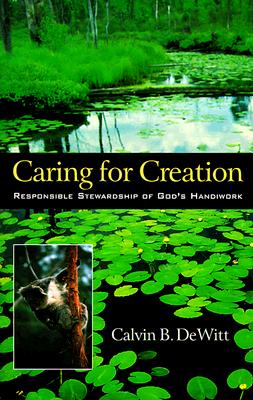 With every order you get a free book. Here’s the one we are giving away: 

Caring for Creation: Responsible Stewardship of God’s Handiwork by Calvin B. DeWitt and others (Baker/CPJ.) This is perfect to share as a free give-away since it is not only illustrates the sort of thing Jubilee cares about — creation care and public policy — but these presentations were originally delivered at the Center for Public Justice’s annual Kuyper lectures. (CPJ was at Jubilee, and yes, their Kuyper lectu
With every order you get a free book. Here’s the one we are giving away: 

Caring for Creation: Responsible Stewardship of God’s Handiwork by Calvin B. DeWitt and others (Baker/CPJ.) This is perfect to share as a free give-away since it is not only illustrates the sort of thing Jubilee cares about — creation care and public policy — but these presentations were originally delivered at the Center for Public Justice’s annual Kuyper lectures. (CPJ was at Jubilee, and yes, their Kuyper lectu
res are inspired by the same former Prime Minister of the Netherlands, the Christian statesman and theologian and cultural activist from the early 1900’s.) The main chapters are by Cal DeWitt, a fine and esteemed environmental scholar who has spoken at Jubilee in the past, and then there are three chapters in response by three other thoughtful leaders. We will offer this one absolutely free to anyone who orders a book from this column.
Here are a few more books that we featured at Jubilee, just a random batch that show the breadth of interesting topics and good reading available for those wanting a Kingdom perspective, living into the ways of God in all of life. For the next few days, we have ’em at 30%, plus the free one shown above. One freebie per order, though…
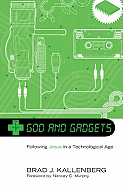 God and Gadgets: Following Jesus in a Technological Age Brad J. Kallenberg (Cascade) $22.00 Friday night speaker James Smith recommended this; and we had a stack of ’em. He was talking about how although the possibilities for gadgets and gizmos is rooted in the good creation order, such things can come back to haunt us. This is theologically meaty, written by a former engineer who is fluent in serious philosophy and astute cultural discernment.
God and Gadgets: Following Jesus in a Technological Age Brad J. Kallenberg (Cascade) $22.00 Friday night speaker James Smith recommended this; and we had a stack of ’em. He was talking about how although the possibilities for gadgets and gizmos is rooted in the good creation order, such things can come back to haunt us. This is theologically meaty, written by a former engineer who is fluent in serious philosophy and astute cultural discernment.
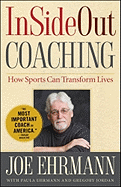 InSideOut Coaching: How Sports Can Transform Lives Joe Ehrmann (Simon & Schuster) $24.00 This really may be one of the great sports books of our time, written by the very wise and honorable Christian star of the old Baltimore Colts (whose story is wonderfully told in Jeffrey Marx’s award winning Season of Life ($21.00). In this one, Ehrmann tells of how caring coaching can transform players into better people. Sounds like a Jubilee-type book! Highly recommended.
InSideOut Coaching: How Sports Can Transform Lives Joe Ehrmann (Simon & Schuster) $24.00 This really may be one of the great sports books of our time, written by the very wise and honorable Christian star of the old Baltimore Colts (whose story is wonderfully told in Jeffrey Marx’s award winning Season of Life ($21.00). In this one, Ehrmann tells of how caring coaching can transform players into better people. Sounds like a Jubilee-type book! Highly recommended.
 The Bond: Our Kinship with Animals, Our Call to Defend Them Wayne Pacelle (William Morrow) $26.99 One of the Jubilee speakers was Christine Gutleben, a charming and passionate spokesperson for faith-based understandings of animal welfare. (She made an important documentary about factory farms.) This is written by her boss, and is a very moving, reasonable argument.
The Bond: Our Kinship with Animals, Our Call to Defend Them Wayne Pacelle (William Morrow) $26.99 One of the Jubilee speakers was Christine Gutleben, a charming and passionate spokesperson for faith-based understandings of animal welfare. (She made an important documentary about factory farms.) This is written by her boss, and is a very moving, reasonable argument.
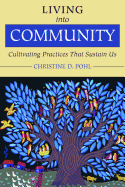 Living into Community: Cultivating Practices That Sustain Us Christian Pohl (Eerdmans) $20.00 There is always an interest among younger adults about community. We sold Bonhoeffer’s Life Together and books by Jean Vanier. But this new work is as good as it gets, offering serious, mature reflections on four key practices that allow our congregations and fellowships to be more authentic communities.
Living into Community: Cultivating Practices That Sustain Us Christian Pohl (Eerdmans) $20.00 There is always an interest among younger adults about community. We sold Bonhoeffer’s Life Together and books by Jean Vanier. But this new work is as good as it gets, offering serious, mature reflections on four key practices that allow our congregations and fellowships to be more authentic communities.
 View from an Urban Loft: Developing a Theological Framework for Understanding the City Sean Benesh (Resource Publications) $23.00 We have a large section of books on urban ministry, social work and such. And we have some on urban design, new urbanism, stuff for architects and planners. This is foundational for any, ruminations on how to embody our discipleship amidst the cityscape. Very nicely done by a guy in Vancouver who directs the Epoch Center for Urban Renewal.
View from an Urban Loft: Developing a Theological Framework for Understanding the City Sean Benesh (Resource Publications) $23.00 We have a large section of books on urban ministry, social work and such. And we have some on urban design, new urbanism, stuff for architects and planners. This is foundational for any, ruminations on how to embody our discipleship amidst the cityscape. Very nicely done by a guy in Vancouver who directs the Epoch Center for Urban Renewal.
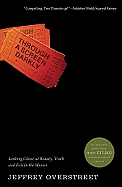 Through a Screen Darkly Jeffrey Overstreet (Regal)
Through a Screen Darkly Jeffrey Overstreet (Regal)
$17.99 I love this guy and here he offers reviews “looking closer at
beauty, truth, and evil in the movies.” Highlights more than 200 films,
a great resource for discussion groups. I know some churches have film
nights and such, but many need some insight about mature, Christian
approaches. Overstreet’s is a great resource. Glad they had a workshop
on this at Jubilee, done by Greg Veltman.
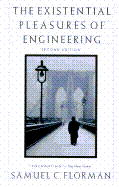 The Existential Pleasures of Engineering Samuel Floreman
The Existential Pleasures of Engineering Samuel Floreman
(Griffin) $15.99 Although not written from an overtly Christian angle,
this wise and eloquent author reminds engineers that there is more to
their work than crunching numbers, weighing data. There is intuitive
wisdom needed and great joy to be found. So true. The New York Times
says it is “gracefully written.”
 An American Childhood Annie Dillard (Harper) $14.00 Not only is this lovely memoir written by a former Pittsburgh Presbyterian, the cover illustrates a classic scene overlooking the “Cathedral of Learning” at the University of Pittsburgh. Jubilee workshop leader Eric Miller (historian and lecturer on intellectual history) suggested that this was a wonderful way to gain a “historical consciousness.” You want that, you know you do. Here ya go.
An American Childhood Annie Dillard (Harper) $14.00 Not only is this lovely memoir written by a former Pittsburgh Presbyterian, the cover illustrates a classic scene overlooking the “Cathedral of Learning” at the University of Pittsburgh. Jubilee workshop leader Eric Miller (historian and lecturer on intellectual history) suggested that this was a wonderful way to gain a “historical consciousness.” You want that, you know you do. Here ya go.
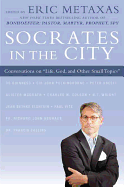 Socrates in the City: Conversations on “Life, God, and Other Small Stuff” edited by Eric Metaxas (Dutton) $27.95 Eric was one of the big hits at the previous year’s Jubilee (and we sold his Bonhoeffer bio quite well.) This is a collection of some of the talks given at a program Eric runs in New York, that hosts some of the best spokespeople for Christian thinking in the world today. A fantastic, helpful anthology of Os Guinness, John Polkinghorne, Jean Bethke Elshtain, Alister McGrath, Francis Collins and more. Highly recommended, especially at this discounted price!
Socrates in the City: Conversations on “Life, God, and Other Small Stuff” edited by Eric Metaxas (Dutton) $27.95 Eric was one of the big hits at the previous year’s Jubilee (and we sold his Bonhoeffer bio quite well.) This is a collection of some of the talks given at a program Eric runs in New York, that hosts some of the best spokespeople for Christian thinking in the world today. A fantastic, helpful anthology of Os Guinness, John Polkinghorne, Jean Bethke Elshtain, Alister McGrath, Francis Collins and more. Highly recommended, especially at this discounted price!
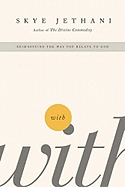 With: Reimagining the Way You Relate to God Skye Jethani (Nelson) $15.99 A a young Baptist pastor friend of mine just got a tattoo of “Immanuel” (in Hebrew.) This is a huge, huge theme with younger adults (as it should be with all of us) –God with us. Jethani is a good writer, a creative thinker, a helpful guide allowing us to reject less than fully faithful assumptions about our walk with God. Margaret Feinberg says “You can’t read this book and not see yourself and others differently.” I almost promoted this from up front at Jubilee, but ran out of time. I’m a fan.
With: Reimagining the Way You Relate to God Skye Jethani (Nelson) $15.99 A a young Baptist pastor friend of mine just got a tattoo of “Immanuel” (in Hebrew.) This is a huge, huge theme with younger adults (as it should be with all of us) –God with us. Jethani is a good writer, a creative thinker, a helpful guide allowing us to reject less than fully faithful assumptions about our walk with God. Margaret Feinberg says “You can’t read this book and not see yourself and others differently.” I almost promoted this from up front at Jubilee, but ran out of time. I’m a fan.
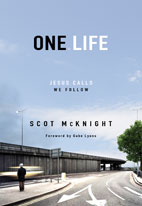 One.Life: Jesus Calls, We Follow Scot McKnight (Zondervan) $14.99 All of life is service to God, not our so-called “spiritual life.” McKnight explores this radical and yet delightful vision of daily discipleship very, very well. One reviewer said that reading this was like “having my heart massaged and taking a round-house kick to my head.” I didn’t know what a round-house kick was until the Chuck Norris jokes about me at Jubilee, but I get what she was saying. This book is tender and sweet and yet pushes us deep into the life of God, and Christ’s call to serve the world.
One.Life: Jesus Calls, We Follow Scot McKnight (Zondervan) $14.99 All of life is service to God, not our so-called “spiritual life.” McKnight explores this radical and yet delightful vision of daily discipleship very, very well. One reviewer said that reading this was like “having my heart massaged and taking a round-house kick to my head.” I didn’t know what a round-house kick was until the Chuck Norris jokes about me at Jubilee, but I get what she was saying. This book is tender and sweet and yet pushes us deep into the life of God, and Christ’s call to serve the world.
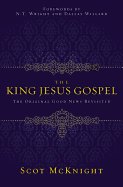 The King Jesus Gospel: The Original Good News Revisited Scot McKnight (Zondervan) $19.99 With a forward by Dallas Willard and N.T. Wright, one would think this assessable book would be a must-read. It explores the theme of the Kingdom of God and helps explain so, so much of what we are about. I am convinced we can’t understand the gospel without this important material about the Kingdom and Christ’s reign. Love it. The cover is classy, if a tad dark, but the book is upbeat and informative. Highly recommended.
The King Jesus Gospel: The Original Good News Revisited Scot McKnight (Zondervan) $19.99 With a forward by Dallas Willard and N.T. Wright, one would think this assessable book would be a must-read. It explores the theme of the Kingdom of God and helps explain so, so much of what we are about. I am convinced we can’t understand the gospel without this important material about the Kingdom and Christ’s reign. Love it. The cover is classy, if a tad dark, but the book is upbeat and informative. Highly recommended.
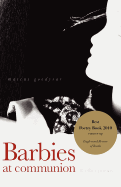 Barbies at Communion & Other Poems Marcus Goodyear (T.S. Poetry Press) $12.00 This won an award a year ago from our friends at the Englewood Review of Books and it is well deserving. You may know Marcus as a key leader in the helpful High Callings blog. He spoke at Jubilee, but not about poetry, so we have a stack of these. Worth every dime; they make lovely little gifts, and is worthy of repeated readings.
Barbies at Communion & Other Poems Marcus Goodyear (T.S. Poetry Press) $12.00 This won an award a year ago from our friends at the Englewood Review of Books and it is well deserving. You may know Marcus as a key leader in the helpful High Callings blog. He spoke at Jubilee, but not about poetry, so we have a stack of these. Worth every dime; they make lovely little gifts, and is worthy of repeated readings.
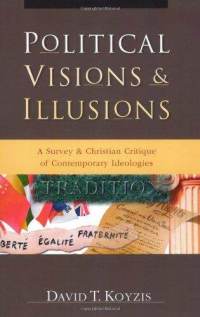 Political Visions and Illusions: A Survey and Christian Critique of Contemporary Ideologies (IVP Academic) $24.00 Gideon Strauss recommended this heartily to those in his workshop on public justice, and Koyzis’s long, deep overview of the history of the development of political ideas shows us that both modern liberals and conservatives have their intellectual roots in stuff from the Enlightenment. The implications are heavy: Christians ought not to too easily identify with either American political party, and must work hard to be discerning about ideological assumptions that do not comport with a balanced, Biblical perspective.
Political Visions and Illusions: A Survey and Christian Critique of Contemporary Ideologies (IVP Academic) $24.00 Gideon Strauss recommended this heartily to those in his workshop on public justice, and Koyzis’s long, deep overview of the history of the development of political ideas shows us that both modern liberals and conservatives have their intellectual roots in stuff from the Enlightenment. The implications are heavy: Christians ought not to too easily identify with either American political party, and must work hard to be discerning about ideological assumptions that do not comport with a balanced, Biblical perspective.
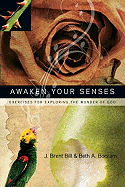 Awaken Your Senses: Exercises for Exploring the Wonder of God J. Brent Bill & Beth A. Booram (IVP) $15.00 There were a number of outdoor eduction leaders at Jubilee and lots of students enjoy wilderness trips and naturey stuff. With the emphasis on creation/new creation I’d think this would be quite popular. I think that some mountaineers and kayakers have their hands full, and don’t think they need a resource for experiential education about God’s presence. Sad, though, because this is a gem of a book, a treasure chest full of specific ideas, using all our senses. Parker Palmer calls it “superb.”
Awaken Your Senses: Exercises for Exploring the Wonder of God J. Brent Bill & Beth A. Booram (IVP) $15.00 There were a number of outdoor eduction leaders at Jubilee and lots of students enjoy wilderness trips and naturey stuff. With the emphasis on creation/new creation I’d think this would be quite popular. I think that some mountaineers and kayakers have their hands full, and don’t think they need a resource for experiential education about God’s presence. Sad, though, because this is a gem of a book, a treasure chest full of specific ideas, using all our senses. Parker Palmer calls it “superb.”
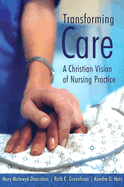 Transforming Care: A Christian Vision of Nursing Practice Mary Molewyk Doornbas, Ruth Groenhout, & Kendra Hotz (Eerdmans) $20.00 I wish anyone who works in health care would consider reading this…very insightful, co-written by a nurse, a philosopher and a theologian/pastor, all from Calvin College. Very impressive, with great ideas about how to relate faith and health care.
Transforming Care: A Christian Vision of Nursing Practice Mary Molewyk Doornbas, Ruth Groenhout, & Kendra Hotz (Eerdmans) $20.00 I wish anyone who works in health care would consider reading this…very insightful, co-written by a nurse, a philosopher and a theologian/pastor, all from Calvin College. Very impressive, with great ideas about how to relate faith and health care.
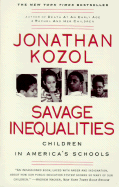 Savage Inequalities: Children in America’s Schools Jonathan Kozol (Harper) $14.99 Long a hero of mine, this passionate work rages against the obvious injustice of how poor school districts have so much less than wealthy one. The Jubilee speaker for education majors this year works in a underfunded city school, and knows first hand the challenges and rewards of this. I say read anything Kozol writes. Here is one of his most popular, searing as it is.
Savage Inequalities: Children in America’s Schools Jonathan Kozol (Harper) $14.99 Long a hero of mine, this passionate work rages against the obvious injustice of how poor school districts have so much less than wealthy one. The Jubilee speaker for education majors this year works in a underfunded city school, and knows first hand the challenges and rewards of this. I say read anything Kozol writes. Here is one of his most popular, searing as it is.
 Bloodlines: Race, Cross, and t
Bloodlines: Race, Cross, and t
he Christian John Piper foreword by Tim Keller (Crossway) $22.99 CCO has always had great concern for raising a multi-cultural witness and helping students traverse the subtle pains of racism. Here, the passionate Baptist preacher names is as sin, and shows how only the cross of Christ and the deep doctrines of justification can provide a gospel-centered answer to this American quandary.
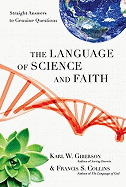 The Language of Science and Faith: Straight Answers to Genuine Questions Karl Giberson & Francis Collins (IVP) $20.00 Remember the bit I wrote (above) from You Lost Me that laments how many young Christians think there is something anti-religious about science, that we need to equip them to think about science in faithful ways? This can help, a great go-to resource. Get a few now while they are on sale!
The Language of Science and Faith: Straight Answers to Genuine Questions Karl Giberson & Francis Collins (IVP) $20.00 Remember the bit I wrote (above) from You Lost Me that laments how many young Christians think there is something anti-religious about science, that we need to equip them to think about science in faithful ways? This can help, a great go-to resource. Get a few now while they are on sale!
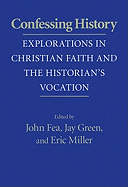 Confessing History: Explorations in Christian Faith and The Historians Vocation edited by John Fea, Jay Green, and Eric Miller (University of Notre Dame Press) $35.00 All three of these good guys have spoken at Jubilee and they are truly rising stars in their field. This collection brings new pieces and important voices to this big question, one that is pressing for any discipline: how does faith color and shape and inform our task? Does the vocation of being a historian get worked out differently if one holds to basic Christian convictions about things? Rave reviews on the back from Mark Noll, from Grant Wacker, from Donald Yerza, director of The Historical Society. Making these kinds of scholarly books available to young students is a good witness, we believe, and we hope that those going on to advanced studies will recall having at least seen this sort of integrated Christian scholarship at the Jubilee book display. Kudos to these fine friends, gentlemen and scholars.
Confessing History: Explorations in Christian Faith and The Historians Vocation edited by John Fea, Jay Green, and Eric Miller (University of Notre Dame Press) $35.00 All three of these good guys have spoken at Jubilee and they are truly rising stars in their field. This collection brings new pieces and important voices to this big question, one that is pressing for any discipline: how does faith color and shape and inform our task? Does the vocation of being a historian get worked out differently if one holds to basic Christian convictions about things? Rave reviews on the back from Mark Noll, from Grant Wacker, from Donald Yerza, director of The Historical Society. Making these kinds of scholarly books available to young students is a good witness, we believe, and we hope that those going on to advanced studies will recall having at least seen this sort of integrated Christian scholarship at the Jubilee book display. Kudos to these fine friends, gentlemen and scholars.
DISCOUNT
any book mentioned
Offer Good Until March 1st
3O% off
and
1 copy of Caring for Creation
FREE
order here
takes you to the secure Hearts & Minds order form page
just tell us what you want
inquire here
if you have questions or need more information
just ask us what you want to know
